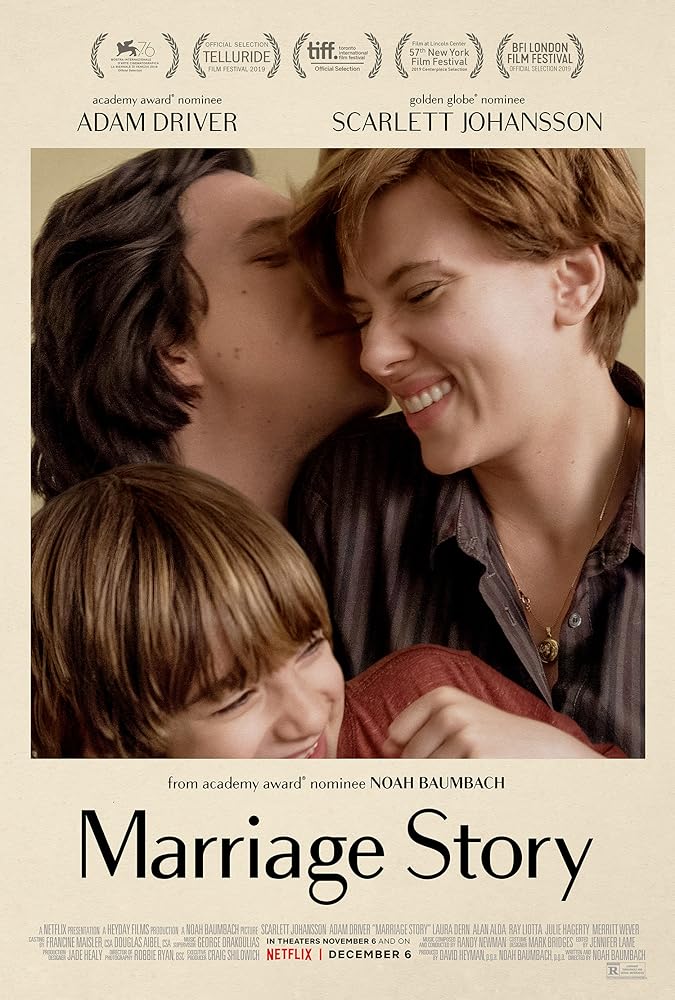
Divorce is never easy for
anyone. It can be bitter, painful, ugly, stressful, liberating, and the fallout
effects more than those directly involved. I should know. My parents split when
I was four. And while many divorces (including and especially those portrayed
in media) are built upon anger, hatred and vindictiveness, what’s often
overlooked is that the reason it’s so hard is because there was once love for
whoever that wrath is aimed at. Noah Baumbach is no stranger to this topic. His
2005 breakthrough, The Squid and the Whale, was partially inspired by
his parents’ divorce, and having now experienced it from both ends (he and
ex-wife Jennifer Jason Leigh parted ways in 2010), Marriage Story shows
a couple that tries to break things off while attempting to rise above all that
ugliness and sidestep all those nasty pitfalls.
Our story follows Charlie
(Adam Driver), a rising talent on New York’s theater circuit, and Nicole (Scarlett
Johansson), an actress who gave up a career in Hollywood to be his muse. We
meet Charlie and Nicole as their whirlwind romance is coming to an end. Although
their marriage is beyond salvaging for a myriad of reasons, they still have a
great admiration for each other and try to end things as civilly as possible.
That becomes easier said than done when Nicole moves back to Los Angeles with
their son Henry (Azhy Robertson) to revitalize her TV career. Charlie is then
forced to decide between staying in New York and nourishing his latest project,
or moving to Los Angeles to keep custody of his son.
While it’s made very clear
that this marriage that was never meant to last, the movie never loses sight of
why Charlie and Nicole were together in the first place. The opening scene is a
dual monologue/montage of the happy times together where they write letters in
a therapy session listing off all the things they love and respect about each other.
Some of that mutual admiration is still there to a certain extent, and both
parties try their best to keep that intact. But all hopes of amicability are
thrown out the window when Nicole moves to LA and hires a lawyer (Laura Dern), something
they agreed to avoid at first. Charlie’s hand is forced, first going with a compassionate
attorney (Alan Alda), then trading him for a more ruthless lawyer (Ray Liotta) better
cut for the trench warfare of the courtroom. The lawyers only make things worse,
trying to paint each other in the worst possible light and pitting their
clients against each other. It almost works.
Noah Baumbach’s specialty has
always been small, grounded stories with naturalistic dialogue, whether it be
the bitterness of a nasty divorce in The Squid and the Whale or the millennial
growing pains of Frances Ha. Here, he finds the parallels between the protagonists’
respective careers and the theatrics of the courtroom. The structure itself is almost
play-like, with limited set-pieces, lengthy monologues, and even two moments
when the characters break out into a Sondheim song number. Even the big
argument scene that comes with the package for any divorce drama is sure to be
recited in acting classes for years to come. That big argument is the emotional
climax of the film, and the only real fight that Charlie and Nicole really
have. Out of context it seems like the typical argument scene you’d come to
expect, but the gradual buildup and the fact that things had been kept so
amicable up to this point makes it one for the ages.
Scarlett Johansson and Adam Driver
have both had a stellar year, with Endgame
and Jojo
Rabbit on Johannsson’s end, and Driver knocking it out of the park with
The
Dead Don’t Die, The Report and The Rise of Skywalker, but it’s
no wonder they’ve been generating Oscar buzz for this movie in particular. Both
commit a well of dedication to conveying not just why these characters were bad
for each other, but reminding themselves (and us) why they were even together
at all. It never asks you to pick a side, instead laying its chest bare to
reveal all the tender innards that kept their marriage ticking and the
inflammations that lead to its shutdown. While Charlie is Noah’s more obvious
stand-in, being a director whose previous marriage fell apart due to infidelity,
there is still empathy for Nicole, who felt suffocated by the choice to turn
her career away for his sake, even if she’s the one who initiated things by
moving their kid cross country and hiring a scorched-earth attorney. Unlike
breakup movies like, say, Revolutionary Road or Blue Valentine
where there’s so much venom from both parties that you nearly choke on it, the
anger here his clearly born out of the awful, stressful nature of the divorce
system, and how it’s designed to make the clean uncomplicated separation that they
desire nearly impossible.
Bottom line, Marriage Story
is a poignant film on love and breakups from a director whose firsthand experience
with it offers insight that’s often overlooked in these types of movies. I
think it’s the desire of every divorcing couple to end things without
destroying each other, and while that clearly isn’t the case for everyone, it
shows that even the most outwardly stable marriages have fault lines underneath
the surface that could give way under the right circumstances. For some who
have experience with this kind of thing, it can be kind of a tough sit, or even
cathartic.
8/10
No comments:
Post a Comment